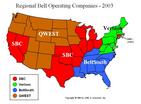Doubtless everyone has heard that
the FCC approved the merger
of Bellsouth with AT&T,
and AT&T has moved ahead
with accomplishing that, with various implications for
cellphone carrier branding, repatriating jobs that are outsourced, etc.
Some of the provisions are interesting, for example,
for a year starting summer 2007 AT&T will give out a free
DSL modem to anyone willing to switch from dialup to DSL.
On the one hand it’s good to see some U.S. carrier finally
doing what Softbank did five or more years ago in Japan.
On the other hand, without dialup, you have even less
choices than you did before for ISPs.
But what does it mean for net neutrality?
Ars Technica thinks it’s good, because of last-minute net neutrality
concessions from the corporate merger candidates, and quotes a prominent
net neutrality backer:
Professor Tim Wu, writing for Savetheinternet.com, praises the neutrality
provisions, but he does note that they are not total. "The agreement does
not prevent AT&T from treating different media carried on the Internet
differently," he says, "so long as the carrier does not discriminate
between who is providing the content. AT&T, under this agreement, may
speed all the Internet video traffic on its network (to compete, for
example, with cable). But it cannot pick and choose whose video traffic
to speed up. In short, AT&T must treat like traffic alike– that is the
essence of the agreement."
AT&T agrees to strong network-neutrality provisions, by Nate Anderson,
29 Dec 2006
Prof. Wu also notes that these provisions don’t apply to AT&T’s longhaul
IP infrastructure (only to its first and last mile infrastructure);
they don’t apply to IPTV; and they only last for two years or until
Congress passes a net neutrality act.
And one of those exceptions could be a big loophole.
Continue reading →

